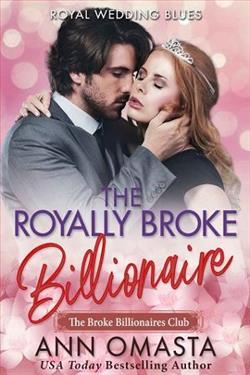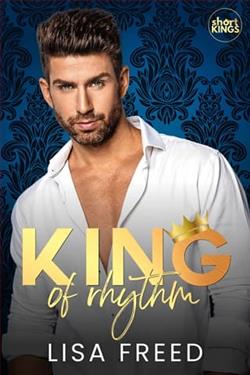Page 59 of Sunrise By the Sea
Polly screwed up her face and ran to make him up a flask of coffee.
‘Be careful out there.’
‘I don’t even know if we can save it,’ said Huckle, grabbing a torch and one of the hurricane lamps. ‘If you see me back in five minutes . . . I’m not sure that’s good news.’
‘Be careful,’ said Polly, going up towards him and nuzzling his neck briefly, breathing in his lovely warm scent. He held her closely.
‘Of course,’ he said. ‘Although you know I have good life insurance. You could replace the windows.’
‘Do not evenjokeabout things like that.’
He kissed her on the forehead as she tipped the hot coffee into the flask and, instinctively, added a couple of spare buns to his pockets. She could tell he was doing his absolute best to be brave, and loved him to distraction.
‘See you later, kiddos.’
And he walked out of the lighthouse and into the maelstrom. Neil eeped and vanished up Polly’s jumper, as freaked out as she was. Polly watched Huckle go, then steeled herself, set her face, turned, with difficulty, back towards the room.
‘Okay, kids!’ said Polly. ‘Who wants a story in front of the fire and some hot chocolate?’
‘Yay!’ said Avery, and even Daisy brightened up at the thought of hot chocolate.
‘Marshmallows?’ she asked innocently.
‘Maybe.’
‘YAY!’
‘I love storms,’ said Avery happily.
Chapter Thirty-seven
Marisa stormed around the house, feeling alternately tearful and furious; cross with Alexei for asking for something she could not give, and cross with herself.
She felt her breathing rise, then, as she stared out the balcony window, did her best to let it pass. The futility of her fury was no use to anyone right now. It felt like a self-indulgence for nobody but herself. And it was a waste of everyone’s energy right then.
It was not her. It was not all she was. It was her brain, lying to her once more. And she wasn’t going to let it.
She looked around the room. And moved purposefully forwards.
Down by the water’s edge, it was becoming Sisyphean. It was meant to be low tide, meaning the causeway was uncovered, but the water was running high anyway, loosening the cobbles as it surged upwards; great waves cracking against the sea wall.
The people of the village had formed a human chain, dumping sand bags and rocks to try and bulwark the wall against the incoming tide, to keep it standing and keep it safe.
But Beach Street already was a river, a morass of water, mud, hideous bits and pieces floating in it, the current growing stronger every moment, and Huckle reckoned they were fighting a losing battle; puny humans against the terrifying power of wind and water was no fight at all.
The water poured down the back of his neck and his waterproofs, freezing him through even as he shouted and yelled at other men. Someone had found a supply of timber, and they were passing it hand over hand to try and brace the wall. That huge Russian piano teacher was tossing them along as if they were twigs. The boats were bouncing up and down and smashing off one another; anything not properly battened down, or anchored too close to another boat, was not going to survive the swell.
One or two people – second-homers, Huckle knew straightaway; their Land Rovers were too clean and shiny – had parked up close on the harbour wall and he told Archie, the fishing captain who was in de facto charge of the mission to get the message out to move your damn car before you lost it – but everyone’s internet was down: phones were draining of charge; there was no power anywhere.
The women not in the line of getting materials along to the sea defences were rapping on doors and moving up the people who had felt they didn’t have to move earlier on; helping to carry valuables to upstairs rooms; comforting distressed older folk.
Huckle took a quick glance at the Little Beach Street Bakery. Despite the sandbags, the water had already reached the level of the low letter box. The old wooden doors, warped and ageing, could not possibly last for long. He couldn’t believe it. All that work, all those years of love and care, the life they were building together, brick by brick, day by day, the business for him and the bakery for Polly, the lighthouse, the children. Nothing else was remotely important to him, other than their family and the life they had created against all the odds; against most people’s expectations, particularly his family’s.
Not an angry man by temperament, he simply carried on trying to build the barricades higher and higher, bolster everything they could. Old ladies were being ferried back and forth up to higher ground with a collection of what they obviously considered essential – Huckle thought he saw a sewing machine, but it couldn’t be, could it? Plenty of small dogs, though, already unsettled by the storm, who thought their owners were being kidnapped and decided to protect them by sharing out the odd nip or two, which felt particularly unfair to the brave and sodden volunteers.
Polly had a million things she wanted to do to help – she should be making up flasks of hot coffee and brandy at the very least – but, she realised, the world didn’t care and what was going on didn’t really matter when you were faced with the sadness of a very small five-year-old. She felt the pull of the village, which needed all hands on deck, even as the storm roared on outside, like a clutch of furies, screaming their rage out across the sky; tearing the world apart.
But instead she sat on Daisy’s bed. There was space for each of the children to have a room – they were little round things, cut in to the second floor – but they had never been parted since they were babies and still shared one, with a baby monitor going up to Polly and Huckle’s room on the third floor.















